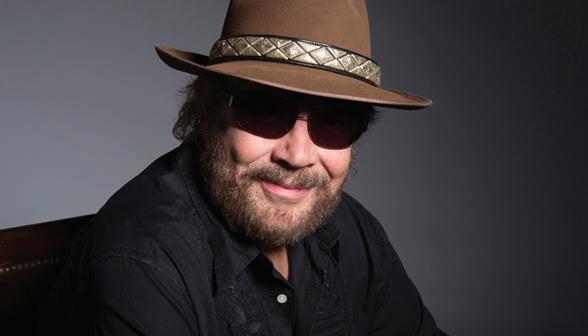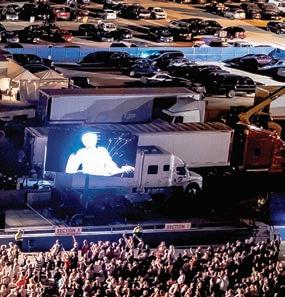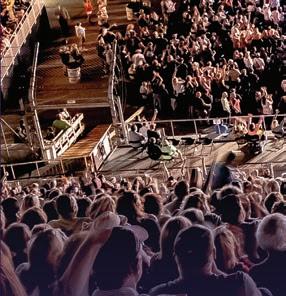
14 minute read
What’s on the Wisconsin State Fair’s Main Stage?
There are many reasons to go to the State Fair: the cream puffs, the animals, the hundreds of vendors—and the music. This year’s State Fair Main Stage lineup spans new wave to Christian pop, hard rock to country.

Advertisement
AUGUST 5
SKILLET WITH COLTON DIXON & LEDGER
BY JAMIE LEE RAKE

Booking Skillet for the Wisconsin State Fair Main Stage checks off multiple boxes to bring in a diverse audience. Hard rock radio listeners know the quartet from their consistent presence in the format for over a decade with a sound that negotiates metal and electronic elements with accessible melodies and anthemic choruses. Fairgoers wanting to support Wisconsin music should appreciate that three Skillet members call the state home—lead singer John Cooper married his wife and current band mate from Kenosha, Korey. And many seats will likely be taken up by some of the band’s fellow Christians. It’s within the evangelical pop market that Skillet released their earliest music in the mid-‘90s in a grungier, borderline indie sound before Cooper incorporated synthesizers. The group’s messaging isn’t didactic enough to prevent it from it being used for placements in rough and tumble sports like pro wrestling. Perhaps surprisingly to some, Cooper has also become in recent months an incisive, impassioned voice on socio-political issues affecting believers.


Photo courtesy of Wisconsin State Fair.
AUGUST 6

CHRIS YOUNG

BY JAMIE LEE RAKE

Though only 15 years since his debut on country radio, it’s as if Chis Young came from a wholly different world. It was one where television singing competitions not only won ratings, but their winners could sustain lengthy runs of national success. Young numbered among those champions, besting the competition on the 2006 season of the USA Network’s Nashville Star.

His debut album introduced a cowboy hat-wearing neo-traditionalist steeping his songs in peals of pedal steel guitar and fiddle. Many of Young’s best early singles prefigured the current vogue of “boyfriend country.” But instead of being obsequiously worshipful of the woman in his life, he more realistically sang of how romance helped to made him a better person who wanted to please his lady love.
Young’s aesthetic angled sharply into the ‘10s, as his lyrics started mirroring the hearty partying sentiments of proto-bro’ country proponents such as Luke Bryan and Brantley Gilbert. Concurrently electronic R&B percussion and crunching arena rock guitars entered his production values. As Young prepares to release his eighth long-player, he sounds to be using his rich baritone on material hewing closer to country orthodoxy.

Photo courtesy of Wisconsin State Fair. Photo by Matthew Berinato.
AUGUST 8
BILLY IDOL

BY DAVID LUHRSSEN


“White Wedding” was outstanding on commercial radio in the early ‘80s, an example of the briefly rising tide of new wave hits. Singer Billy Idol delivered an unforgettable story about an unhappy wedding day with gruffly understated menace and irony. And he followed “White Wedding’s” success with the furiously upbeat “Dancing with Myself” and the haunting “Eyes without a Face,” among other hits.
Idol brought punk credibility into his pop music career. He had been lead vocalist for one of the U.K.’s early punk rock bands,

Photo courtesy of Wisconsin State Fair.
Generation X, formed at a time when the generational cohort that later adopted that label were only toddlers. In late ‘70s punk circles, “Generation X” referred to the coming of age of Late Boomers, old enough to watch the ‘60s on TV but too young to take part.
From 1993 to 2005, Idol largely disappeared from view and cleaned up a drug problem. He reemerged this century with a couple of albums of new material, occasional guest appearances with other acts, and resumed touring.
AUGUST 9


CASTING CROWS WITH WE THE KINGDOM

BY JAMIE LEE RAKE

Casting Crowns make contemporary Christian music (CCM) look easy, in good ways. At heart of their genre is striking a balance between the spiritual and the commercial. The primary intention may be to inspire, encourage and challenge fellow saints and listeners they want to evangelize; but CCM artists' call to musical ministry is subject to the necessity of bringing in enough revenue to keep themselves and the infrastructure supporting them solvent.
In a scene some acts use as a launchpad to worldly success, the Crowns inhabit it with motives purer than many, but sales and

Photo courtesy of Wisconsin State Fair.
airplay enough to earn respect from the music business at large. Lead singer/songwriter Mark Hall comes from a Baptist youth pastor background, and the group remain accountable to their home congregation in suburban Atlanta. None of that would matter if substantive artistry didn’t come with their circumspection. And for hooky pop rock with Americana undercurrents, they need not play second fiddle to anyone in the secular realm. The band likewise merit kudos for pushing evangelical musical expression’s decades of U2 pastiche aside for some brighter Coldplay influence on its sonic color palette.


AUGUST 10
FOREIGNER
BY MICHAEL POPKE

For some music fans, an outdoor concert at the Wisconsin State Fair’s Main Stage might be the perfect way to ease back into live music. And hearing Foreigner’s timeless classic rock anthems —“Hot Blooded,” “Head Games,” “Urgent,” “Feels Like the First Time” and the ubiquitous ballad “I Want to Know What Love Is,” among them—will be sonic comfort food for listeners of a certain age.
It’s no surprise the band is calling its first post-pandemic trek across America “The Greatest Hits of Foreigner Tour.” (Incidentally, Milwaukee was Foreigner’s final pre-pandemic stop before coming off the road in March 2020). With 10 multiplatinum albums and 16 U.S. Top 30 singles released between 1977 and 1987, expect plenty of nostalgia.
Bur Foreigner has not rested entirely on its laurels, touring consistently and releasing a 2009 studio album titled Can’t Slow Down, which debuted at No. 29 on the Billboard 200.
Only one original member remains from the band that formed in 1976—76-year-old guitarist and chief songwriter Mick Jones—but Foreigner still boasts a robust lineup that includes vocalist Kelly Hansen (Hurricane) and bassist Jeff Pilson (Dokken). Both joined in the mid-2000s and brought new spirit and energy. Pilson, 62, still rocks with contagious enthusiasm, and Hanson, 60, honors original singer Lou Gramm’s legacy while also making the songs his own.


Opening for Foreigner will be another band with longevity. ASIA featuring John Payne is an offshoot of the original ASIA supergroup, in which Payne handled lead vocals and played bass from 1991 to 2006.

Photo courtesy of Wisconsin State Fair.
AUGUST 11

BROTHERS OSBORNE

BY JAMIE LEE RAKE

For a genre with the populist roots country music has, it may be unusual for an act to brand themselves as “Not for Everyone.” But the Brothers Osborne are for enough people to have maintained a major label country career for since 2013 with a fair share of critical acclaim and industry awards.

Credit Maryland siblings John (the hirsute lead guitar-player) and T.J. (the clean-shaven lead singer) Osborne with maintaining the favor they do by consistently balancing the demands of commercial radio gatekeepers, including the occasional au courant incursion of electronic production elements, with plenty of instrumental rootsiness and lyrical intelligence. Being smart doesn’t mean the Osbornes can’t be silly, though, as borne out by one of their biggest hits, “Shoot Me Straight,” as well as the deadpan comedic schtick they can deliver in their music videos.
The Osbornes likewise deliver the superior iterations of the kind of odes of inspiration and redemption historically associated with country as well, such as “I Don’t Remember Me (Before You).” Canadian newcomer Tenille Townes will open their State Fair show.

Photo courtesy of Wisconsin State Fair.




AUGUST 12
GABRIEL IGLESIAS

BY JAMIE LEE RAKE

Gabriel Iglesias may be big as he ever has been. But he’s also glad to not be as large as he once was. The comedian’s ascent in popularity in the ‘00s can be attributed to in part to his ability to kid on himself, like saying that he wasn’t overweight but merely fluffy. Dropping 100 pounds in recent years, however, has coincided with the kind of popularity that has allowed him to play the world with his fairly family-friendly brand of stand up.
That breadth of global travel, becoming a father and other life-changing experiences, have enriched his humor. Where he was once reliant on self-referential asides and anecdotes, he


Photo courtesy of Wisconsin State Fair.
has matured into a deft storyteller who gets an exceptionally high rate of laughs per minute. The progression in Iglesias’ depth hasn’t overshadowed his gifts for impersonations, mimicry of accents, sound effects and the continuing spectacle of someone who’s still rather physically imposing being manically animated.
The culmination of his act is like having a hyper, well-traveled friend who happens to be a gut-busting raconteur. He has translated his relatability into voice acting in cartoon movies and anchoring a Netflix sitcom.
AUGUST 13

BOYZ II MEN

BY JAMIE LEE RAKE

Boyz II Men’s 1991 debut, Cooleyhighharmony, not only began the vocal group's ascent to becoming the most successful pop ensemble of the decade and best-selling R&B group ever; it also signaled what is so far the last surge of male harmony singing in secular African American vernacular music.
The boom of such sounds sparked by the then-quartet's first hit, "Motownphilly," didn't survive long in popularly into the current millennium. But the best of Boyz II Men transcends nostalgic appeal to remain examples of a kind of lush, tender artistry absent


Photo courtesy of Wisconsin State Fair.
from current mainstream R&B and in short supply in its complementary radio format geared to adults. By melding doo wop and influences from ‘60s and ‘70s soul vocal groups with touches of scat singing into a fresh, youthful sound, Boyz II Men made a more wholesome alternative to the increasingly dark sonic and lyrical paths hip-hop was taking at the time.
For anyone forgetting just how omnipresent Boyz II Men were in their commercial prime, their four biggest singles spent a whopping 50 weeks atop Billboard's Hot 100 in a span of five years.

AUGUST 14
BEACH BOYS

BY DAVID LUHRSSEN

Dick Dale and the instrumental bands of the early ‘60s played surf music, their reverberating guitars catching the rise and swell of the ocean. But ask most people about surf music and they’ll answer: The Beach Boys. They sang about surfing as well as teenage car culture and the sunny side of the California Dream, dominating the Top-40 in the early through mid-‘60s.

Brian Wilson, the genius of the band, wasn’t content to rest on his early hits. His melodies and production grew more sophisticated, resulting in “Good Vibrations” and The Beach Boys’ superb 1966 album Pet Sounds. The Beatles felt the creative challenge and responded with Sgt. Pepper. Wilson planned to top himself but his follow-up album, Smile, disintegrated and waited until 2004 before the pieces were assembled and released. Drugs and madness were part of the story.
And yet, for 50 years since their creative peak, The Beach Boys have been nostalgic brand name for the endless summers of youth. In whatever lineup is assembled, they continue to deliver a rack of cheery hit from their early years, including “California Girls” and “Surfin’ Safari.”

Photo courtesy of Wisconsin State Fair.
AUGUST 15

HANK WILLIAMS JR.
BY BLAINE SCHULTZ

Hank Williams Jr. was just three years old when his father died on New Year’s Eve 1953. Nicknamed “Bocephus” by his dad, Hank Jr. made his first television appearance in 1964 and his career was off and running. Moving from his father’s shadow, his 1975 album Hank Williams Jr. and Friends planted him firmly in the popular Southern Rock genre.
Last year, he was inducted into the Country Music Hall of Fame. “It’s a bright spot during a difficult year,” he said. “I have been making top 10 records for 56 years. I fell off a mountain and tried to reinvent myself as a truly individual artist and one who stepped out of the shadows of a very famous man … one of the greatest. I’ve got to thank all those rowdy friends who, year after year, still show up for me. It’s an honor to carry on this family tradition. It is much appreciated.”
He was referring to a 1973, near-fatal, mountain climbing accident that left Williams seriously injured and scarred. When he returned to performing, the beard, sunglasses and cowboy hat became his trademark look. In 1989 Monday Night Football began using a new version of his “All My Rowdy Friends Are Coming Over Tonight” as “All My Rowdy Friends Are Here on Monday Night.” (The song was ultimately pulled because of political comment Williams made.)
His son Shelton Williams, known as Hank III, performs rough-hewn country music as well as hardcore punk and speed metal continuing the family tradition.































